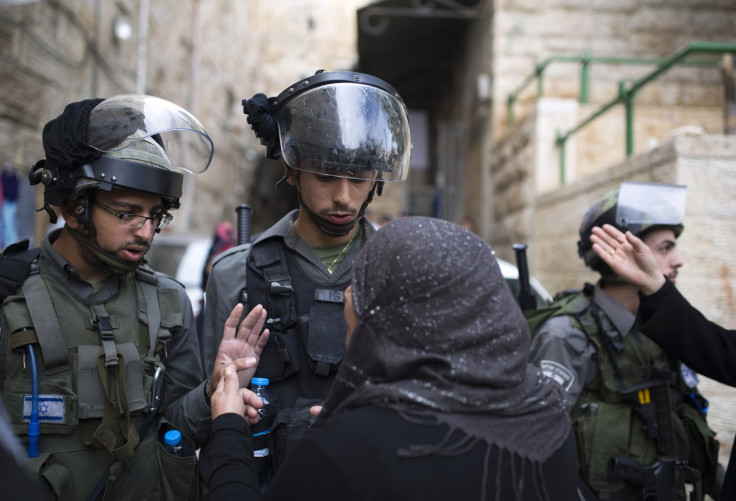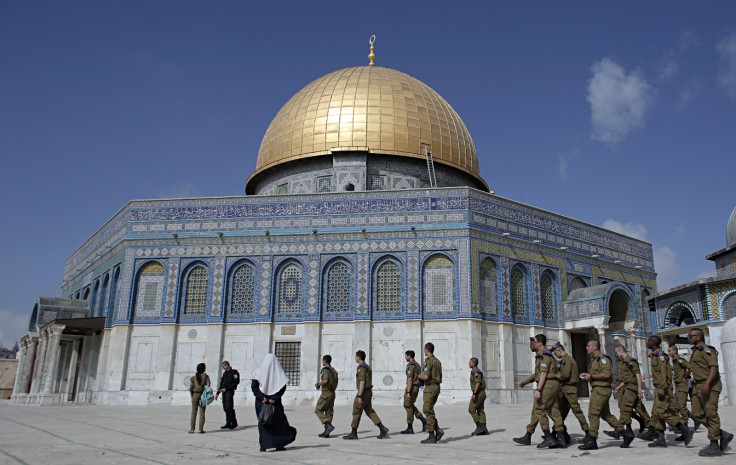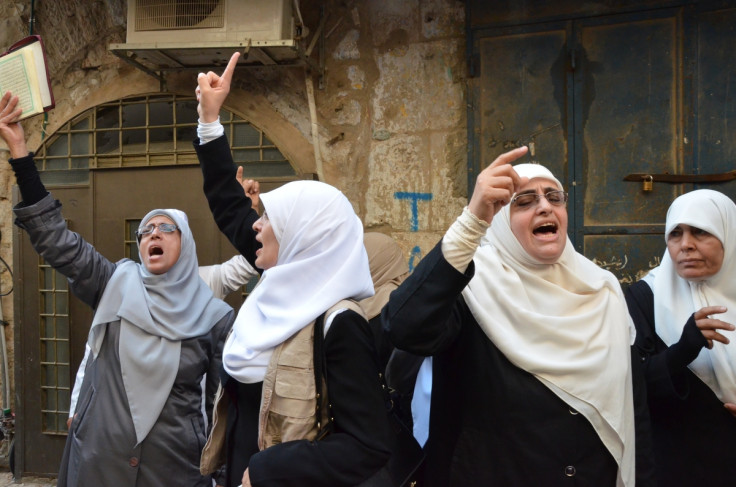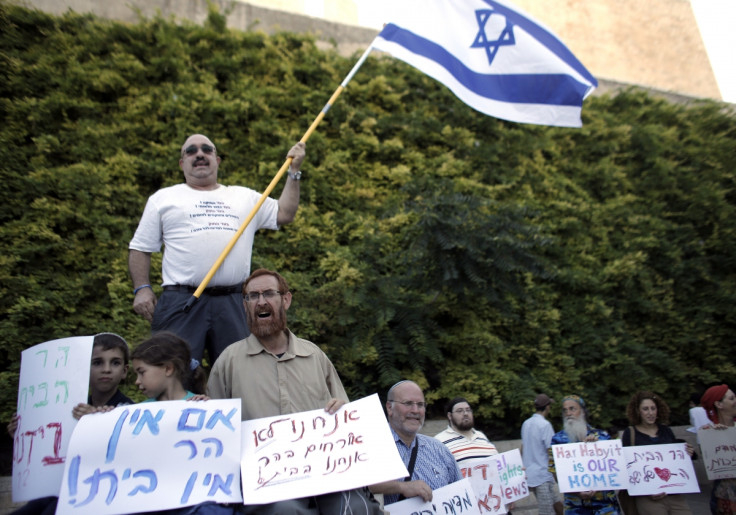Jerusalem and the temple of doom: Jews and Muslims clash over access to al-Aqsa compound

The green doors of the mosque stand like scarred giants, with gaping holes torn through the wood. The debris of four days of rioting between Palestinians and Israeli police lie in a large pile to one side, while pieces of wood, metal, book cases and burned carpet litter the courtyard.
This is Al Aqsa Mosque, the third holiest site in Islam after Mecca and Medina and the flashpoint for violence in divided Jerusalem for decades. Just days ago, Palestinian protesters were holed up inside the mosque throwing stones and petrol bombs at Israeli police, who fought back before sealing the doors of the building. Palestinians claim the police entered the mosque itself.
By Thursday, the violence had spilled into the warren of streets and alleys that surround the Al Aqsa compound, which contains both the mosque and Dome of the Rock, with its golden dome. On Friday, Jerusalem was poised for more violence with a heavy police presence and journalists being prevented from entering the Old City at all.
Blind faith?

Violence at al-Aqsa is no new phenomenon. In 2000 it was a visit to the site by Ariel Sharon that sparked the bloody second intifada, or uprising, in the West Bank and Gaza.
Ever since, many Jewish activists have attempted to visit the compound, which is believed to be the site of the first and second Jewish temple and therefore the holiest site in Judaism. Jews can worship below the mosque at the Western Wall, believed to be an original outer wall of the temple.
Traditional Judaism banned Jews from going to the Temple Mount for fear they might desecrate the inner chamber of the sanctuary in the Jewish Temple reserved for the presence of God that could be entered only by the High Priest on the Day of Atonement (Yom Kippur).
Since Israel conquered the Old City of Jerusalem in 1967 from Jordan, the mosque compound has been under Jordanian administration but Israeli military control. Jews are allowed to visit the site but they are not permitted to pray, and a group of Muslim security guards known as the 'Waqf' patrol the site to ensure that visiting Jews are not breaking the rules.
In the earliest years of Islam, Muslims prayed in the direction of Jerusalem until the Prophet Mohammed and his followers were expelled to Medina, and began praying towards Mecca. Muslims believe that the mosque is built on the spot where Mohammed ascended to heaven.
As the riots raged, a group of Muslim Palestinian women were protesting in front of Israeli border police. One, Aida Sidawi, had been banned from entering the Al Aqsa compound for two months and is a member a group who see their role as defending the mosque from what they see as Jewish extremists who insist on praying when they visit.
She has been put in prison three times, each for 48 hours for her protest inside Al Aqsa compound. The group of women known as the Mourabitat and their counterparts, the men, known as the Mourabitoun, were declared illegal over a week ago by Israel's Defence Minister Moshe Yaalon, paving the way for prosecution of the groups' members.
Sidawi has lived in Jerusalem's Old City since she was 15. Now she spends each morning protesting her ban from Al Aqsa.
She sits beside one entrance to the mosque. Her petite frame is fully covered by her black abaya (long dress) with delicate white embroidery and a black headscarf. She has kind brown eyes but a militancy about her as she leaps to her feet at a moment's notice.
She divides her time between chanting at Israeli forces and Jewish groups leaving the Al Aqsa compound and sitting resting her swollen feet and damaged voice box on the steps leading into the site. She says: "I don't know if my feet or my voice hurt more, but all I can say is it's worth it."
Suddenly she leaps into action joining another 20 women who have also been banned for varying periods from entering the mosque. A Jewish group is escorted out of Al Aqsa compound past the protesting women. Some of the Jewish men film the protesting women on their mobile phones.
"With our spirit, with our blood we will redeem you: Al Aqsa," Aida screams, and the women echo after her.
"From Al Aqsa we have been forbidden. This is Palestine, we are not terrorists," the group yell in unison, waving Qurans bound in burgundy leather cases.

In a flash of movement, a group of young men and boys run down the alley holding hands and they form a guard in front of the women. Several of the youth are dragged off by police.
One of them, Abdullah, 21, tells IBTimes UK that he is here to support the women who have been banned. "We don't have weapons or anything else to defend ourselves with, but we do have our voices so we protest," he said.
Suha Eid, 54, a mother of six, said her female friends in the group including her sister had been dragged and thrown to the ground by police during the week. "I have been banned for two months and it's the seventh ban in a year," she said.
On Wednesday, there were 53 women on a list of names of those banned from the Al Aqsa compound and the number is growing by the day.
When IBTimes UK was inside the Al Aqsa compound, a woman began chanting "Allahu Akbar [God is great]" as a Jewish group was fielded by heavily armed Israeli forces around the compound. She was dragged out of the compound by another group of Israeli border police.
Jerusalem Mayor Nir Barkat denied Israeli leadership had any motive to change the status quo on the site. "[It] is not always the most logical, however [the] Israeli government [...] respects the status quo and it says the following: Jews and visitors can enter the site but not pray on it," he said.
"The Jews ask us why we can't pray on the site that's holiest to Jews, and Muslims say why do Jews enter the site that is holy to Muslims - everyone wants to move the status quo in a different direction - but for the benefit of living in the city of Jerusalem we must maintain [it] to the detail."

Sheikh Omar Kiswani, the director of Al Aqsa Mosque, called on police to close the compound to non-Muslim visitors ahead of the Jewish New Year but his request was ignored.
He said the number of Jewish visitors that he labelled "Jewish extremists" had increased tenfold since 2003 when the Moroccan Gate was opened to Jewish visitors. Initially only three to five Jewish visitors entered the site each day; today, that has risen to 1,000 a month and up to 1,000 per day during Jewish holidays.
"Jewish settlers come all the time and come to certain spots and they stand by the Dome of the Rock and yell that it belongs to them and then they perform prayers. They don't respect this place and the rituals performed here," he said.
For the Jewish community, though, it is an injustice that Jews are forbidden from praying at the site. Rabbi Shmuel Rabinovitch, the Rabbi of the Western Wall, has put signs about the outside of the entrance to the Dome of the Rock and Al Aqsa Mosque saying it is forbidden from Jews to enter (see box), but he is unhappy with the restrictions and argues that Muslims are not prevented from praying at the Western Wall.
"The Jewish way says we do not have a monopoly over God - that's why this place [the Western Wall] is open to everyone. A holy place should not be closed for anyone, no matter what his religion is, or what his view on life if," he said.

Others go further. Right-wing Jewish activist Yehuda Glick has long advocated for an increased Jewish presence and prayer on the site and survived an assassination attempt in 2014, when he was shot four times at close range in the chest, stomach and arm by a Palestinian man who police later shot and killed.
Until May this year, a court order banned Glick from visiting the Al Aqsa compound but on 5 May, this was partially overturned and he was allowed to return to the site but only once a month and is forbidden from taking his mobile phone. Police opposed the lifting of the ban said Glick posed a danger to the public order at the compound.
"I do see life differently now, surviving a major trauma has certainly changed me and I take more precautions. I have purchased a pistol, hired a bodyguard at my own expense and I wear a bulletproof vest," he told IBTimes UK.
""People wanted to discourage me from what I believe. I won't be discouraged. It makes my very sad when you see Jews cannot go into the Temple Mount freely without being under threat. It's a sad situation. It should be a centre of peace and respect."
© Copyright IBTimes 2025. All rights reserved.






















